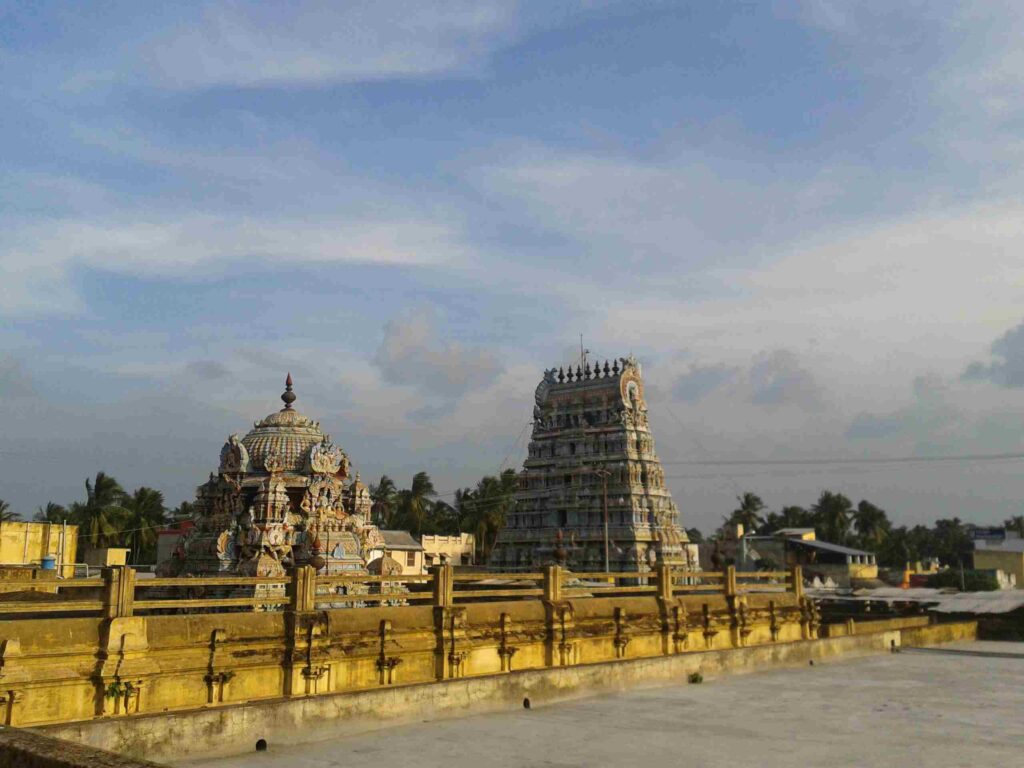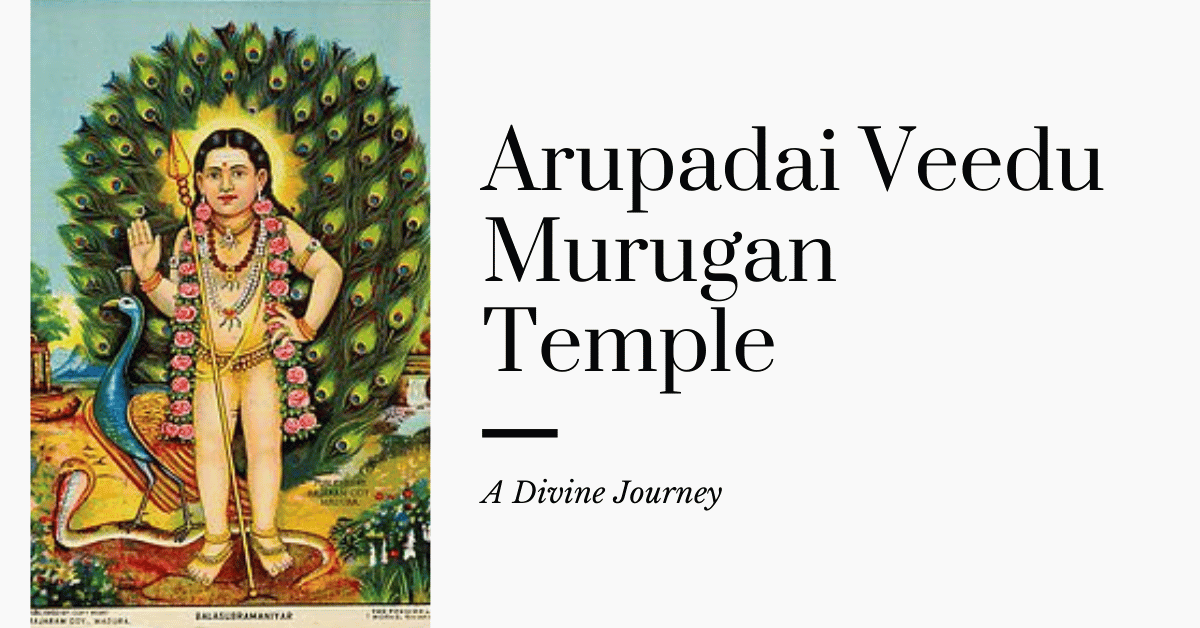The Arupadai Veedu Murugan Temple is one of the most revered and significant pilgrimage sites for devotees of Lord Murugan. Known for its spiritual and cultural significance, this temple is a must-visit for anyone looking to explore the rich heritage of Tamil Nadu. In this blog, we will delve deep into the Arupadai Veedu Murugan Temple, providing a comprehensive guide that includes the Arupadai Veedu Murugan Temple list, timings, contact information, and much more.
Arupadai Veedu Murugan Temple List
The term “Arupadai Veedu” translates to “Six Battle Camps” in Tamil, referring to the six holy abodes of Lord Murugan. These temples are spread across Tamil Nadu and are steeped in mythology and history. Here is the Arupadai Veedu list:
- Thiruparankundram
- Tiruchendur
- Palani
- Swamimalai
- Thiruthani
- Pazhamudircholai
Each of these temples holds a unique place in the hearts of devotees and offers a distinct spiritual experience.
Arupadai Veedu Murugan Temple Details
Thiruparankundram
Thiruparankundram is considered the first abode of Lord Murugan. It is believed that Lord Murugan married Deivanai here after defeating the demon Surapadman. The temple is carved out of a hill and offers a serene atmosphere for devotees. The temple’s ancient rock-cut architecture is a testament to the Dravidian style and dates back to the Pandya period. The main deity, Lord Murugan, is seen in a standing posture with his consort Deivanai by his side.
Tiruchendur
Located on the shores of the Bay of Bengal, Tiruchendur is known for its unique coastal setting. This is where Lord Murugan vanquished the demon Surapadman. The temple’s picturesque location makes it a favorite among pilgrims. The temple’s Gopuram, or tower, is an architectural marvel, standing at 137 feet tall. The idol of Lord Murugan here is depicted as Senthil Andavar, a youthful and valiant warrior.
Palani
Palani is famous for its hill temple dedicated to Dhandayuthapani Swamy, an incarnation of Lord Murugan. Devotees often undertake a challenging climb to reach the temple, seeking blessings for health and prosperity. The temple is one of the oldest in Tamil Nadu, with the idol made of a mixture of nine poisons known as “Navapashanam.” The deity here is depicted in a meditative posture, symbolizing renunciation.
Swamimalai
Swamimalai is where Lord Murugan imparted the meaning of the Pranava Mantra “Om” to his father, Lord Shiva. The temple is renowned for its spiritual teachings and is a center of Vedic learning. The temple is situated on a small hillock, which is believed to represent the ascent to wisdom. The idol of Murugan here is known as Swaminathan, and he holds a staff of knowledge, emphasizing his role as a teacher.

Thiruthani
Thiruthani is associated with Lord Murugan’s victory over the demon Surapadman and his subsequent marriage to Valli. The temple, situated on a hill, offers a panoramic view of the surrounding landscape. The five peacocks in the temple are said to represent the five Vedas, and Murugan here is seen as Kalyana Subramanya, the lord of auspiciousness.
Pazhamudircholai
Pazhamudircholai, located near Madurai, is surrounded by dense forests and is known for its serene and tranquil environment. It is believed that Lord Murugan resides here with his consorts Valli and Deivanai. The temple is unique as it is one of the few where Murugan is seen with both his consorts. The lush greenery and the natural springs in the area add to the temple’s charm.
Arupadai Veedu Murugan Temple Map
For devotees planning a pilgrimage, having a clear map of the Arupadai Veedu temples is essential. The temples are spread across different districts of Tamil Nadu, and a well-planned itinerary can help cover all the temples efficiently. Here is an overview of the locations:
- Thiruparankundram: Near Madurai
- Tiruchendur: Near Tuticorin
- Palani: Near Dindigul
- Swamimalai: Near Kumbakonam
- Thiruthani: Near Chennai
- Pazhamudircholai: Near Madurai
Arupadai Veedu Murugan Temple Timings
Timings vary for each temple, so it’s important to check in advance to plan your visit. Here are the general timings for the temples:
- Thiruparankundram: 5:30 AM to 1:00 PM, 4:00 PM to 9:00 PM
- Tiruchendur: 5:00 AM to 12:30 PM, 5:00 PM to 9:00 PM
- Palani: 6:00 AM to 8:00 PM
- Swamimalai: 6:00 AM to 12:30 PM, 4:00 PM to 8:00 PM
- Thiruthani: 6:00 AM to 9:00 PM
- Pazhamudircholai: 6:00 AM to 6:00 PM
It’s always best to check the official website or contact the temple administration for the most accurate and up-to-date timings.
Arupadai Veedu Murugan Temple, Besant Nagar Contact Number
For those in Chennai, the Arupadai Veedu Murugan Temple in Besant Nagar is a convenient option. You can contact the temple for more information on timings and services. The contact number for the Arupadai Veedu Murugan Temple in Besant Nagar is 044 4505 0203.
FAQs About Arupadai Veedu Murugan Temple
Q.1) முருகனின் முதல் படைவீடு எது?
முருகனின் முதல் படைவீடு திருப்பரங்குன்றம் ஆகும்.
Q.2) முருகனின் வேறு பெயர் என்ன?
முருகனின் வேறு பெயர்கள் சுப்பிரமணியன், கார்த்திகேயன், வேலன் மற்றும் குமரன் ஆகும்.
Q.3) பழமுதிர்ச்சோலை எந்த மாவட்டம்?
பழமுதிர்ச்சோலை மதுரை மாவட்டத்தில் உள்ளது.
Q.4) முருகனின் படை தலைவர் யார்?
முருகனின் படை தலைவர் வீரபாகு சுவாமி.
The Significance of Each Temple Arupadai Veedu Murugan Temple
Thiruparankundram
Thiruparankundram is considered the first abode of Lord Murugan. It is believed that Lord Murugan married Deivanai here after defeating the demon Surapadman. The temple is carved out of a hill and offers a serene atmosphere for devotees. The temple’s ancient rock-cut architecture is a testament to the Dravidian style and dates back to the Pandya period. The main deity, Lord Murugan, is seen in a standing posture with his consort Deivanai by his side.
Tiruchendur
Located on the shores of the Bay of Bengal, Tiruchendur is known for its unique coastal setting. This is where Lord Murugan vanquished the demon Surapadman. The temple’s picturesque location makes it a favorite among pilgrims. The temple’s Gopuram, or tower, is an architectural marvel, standing at 137 feet tall. The idol of Lord Murugan here is depicted as Senthil Andavar, a youthful and valiant warrior.
Palani

Palani is famous for its hill temple dedicated to Dhandayuthapani Swamy, an incarnation of Lord Murugan. Devotees often undertake a challenging climb to reach the temple, seeking blessings for health and prosperity. The temple is one of the oldest in Tamil Nadu, with the idol made of a mixture of nine poisons known as “Navapashanam.” The deity here is depicted in a meditative posture, symbolizing renunciation.
Swamimalai
Swamimalai is where Lord Murugan imparted the meaning of the Pranava Mantra “Om” to his father, Lord Shiva. The temple is renowned for its spiritual teachings and is a center of Vedic learning. The temple is situated on a small hillock, which is believed to represent the ascent to wisdom. The idol of Murugan here is known as Swaminathan, and he holds a staff of knowledge, emphasizing his role as a teacher.
Thiruthani
Thiruthani is associated with Lord Murugan’s victory over the demon Surapadman and his subsequent marriage to Valli. The temple, situated on a hill, offers a panoramic view of the surrounding landscape. The five peacocks in the temple are said to represent the five Vedas, and Murugan here is seen as Kalyana Subramanya, the lord of auspiciousness.
Pazhamudircholai
Pazhamudircholai, located near Madurai, is surrounded by dense forests and is known for its serene and tranquil environment. It is believed that Lord Murugan resides here with his consorts Valli and Deivanai. The temple is unique as it is one of the few where Murugan is seen with both his consorts. The lush greenery and the natural springs in the area add to the temple’s charm.
Arupadai Veedu Murugan Besant Nagar Timings
For those visiting the Besant Nagar temple in Chennai, the timings are as follows:
- Morning: 7:00 AM to 11:00 PM
- Evening: 5:00 PM to 8:30 PM
The Cultural and Religious Significance of Arupadai Veedu Murugan Temple
The Arupadai Veedu Murugan temples are not just places of worship but are also central to Tamil culture and tradition. Each temple has its own festivals and rituals, attracting thousands of devotees from all over the world. The most significant festival is Thaipusam, celebrated in January or February, which commemorates the occasion when Parvati gave Murugan a vel (spear) to vanquish the demon army.
Another important festival is Panguni Uthiram, which marks the celestial wedding of Murugan and Deivanai. Each temple has its own unique way of celebrating these festivals, reflecting the local customs and traditions.
Scholarly Perspectives on Arupadai Veedu Murugan Temple
Scholars and historians have studied the Arupadai Veedu temples extensively, exploring their architectural marvels, historical significance, and religious importance. The temples are prime examples of Dravidian architecture, with intricate carvings, towering Gopurams, and expansive courtyards. They serve as a testament to the artistic and architectural skills of ancient Tamil builders.
Moreover, the temples are repositories of Tamil literature and inscriptions. They hold numerous inscriptions that provide insights into the socio-political and economic conditions of the times. These inscriptions are invaluable resources for historians and researchers studying the history of Tamil Nadu.
Conclusion to Arupadai Veedu Murugan Temple Blog
The Arupadai Veedu Murugan Temple is not just a place of worship but a journey through the rich cultural and spiritual heritage of Tamil Nadu. Each temple in the Arupadai Veedu list has its own unique significance and offers a different aspect of Lord Murugan’s divine presence. Whether you are seeking spiritual solace or exploring the historical and architectural marvels of these temples, a visit to the Arupadai Veedu Murugan Temple will be a fulfilling and enriching experience.
Plan your pilgrimage, explore the Arupadai Veedu map, check the timings, and embark on a divine journey to the six abodes of Lord Murugan. For any assistance or more information, do not hesitate to contact the respective temple administrations.
May Lord Murugan bless you on this sacred journey!
Read More:
- The Fascinating Story of Redi Ganpati: A Hidden Gem in Maharashtra
- Lingashtakam Lyrics in Hindi (लिंगाष्टकम): Meaning, Benefits
References for Arupadai Veedu Murugan Temple Blog
- Kumar, R. (2015). Murugan: The Lord of Tamil Nadu. Chennai: Tamil Heritage Publications.
- Narasimhan, S. (2018). The Divine Abodes of Murugan: A Historical and Architectural Study. New Delhi: Heritage India Press.
- Raj, P. (2020). Mythology and Festivals of Tamil Nadu. Madurai: Cultural Heritage Books.
- Arupadai Veedu Murugan Temples Official Websites and Brochures.
- Sambandam, K. (2016). The Temples of Tamil Nadu. Chennai: Dravidian Architectural Trust.
